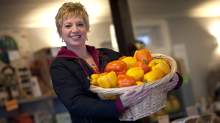 If you think eating organic means you’re safe from genetically engineered food, think again. Now that Whole Foods, Organic Valley and Stonyfield Farm are hooking up with Monsanto, it just got harder to keep GMO food off your plate.
If you think eating organic means you’re safe from genetically engineered food, think again. Now that Whole Foods, Organic Valley and Stonyfield Farm are hooking up with Monsanto, it just got harder to keep GMO food off your plate.
In the Organic Consumers Association recent article, The Organic Elite Surrender to Monsanto, details of the sordid little affair have now been made public.
In the wake of a 12-year battle to keep Monsanto’s Genetically Engineered (GE) crops from contaminating the nation’s 25,000 organic farms and ranches, America’s organic consumers and producers are facing betrayal. A self-appointed cabal of the Organic Elite, spearheaded by Whole Foods Market, Organic Valley, and Stonyfield Farm, has decided it’s time to surrender to Monsanto. Top executives from these companies have publicly admitted that they no longer oppose the mass commercialization of GE crops, such as Monsanto’s controversial Roundup Ready alfalfa, and are prepared to sit down and cut a deal for “coexistence” with Monsanto and USDA biotech cheerleader Tom Vilsack.
I guess even the best of organic companies can lose sight of their roots and sell out when fame and fortune go to their heads. What a blow for local and sustainable food systems.


